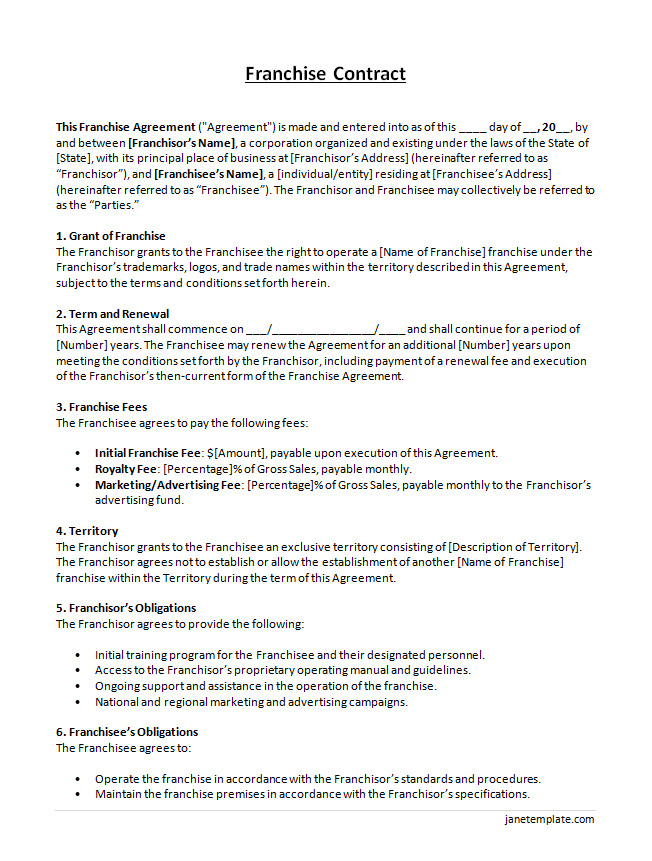
A franchise contract is a legally binding agreement between a franchisor and a franchisee that outlines the terms and conditions of the franchise relationship. It serves as a roadmap for how the franchisee should operate the business in line with the franchisor’s brand and intellectual property.
This contract ensures consistency and protects the interests of both parties involved.
Why is a Franchise Contract Necessary?
A franchise contract is necessary for several reasons:
- Legal Protection: The franchise contract provides legal protection to both the franchisor and the franchisee. It clearly defines the rights and responsibilities of each party, minimizing the risk of misunderstandings or disputes.
- Brand Consistency: The franchise contract ensures that the franchisee operates the business consistently with the franchisor’s brand standards. This includes maintaining the same quality of products or services, adhering to the brand’s visual identity, and following established operational procedures.
- Intellectual Property Protection: The franchise contract safeguards the franchisor’s intellectual property, such as trademarks, trade secrets, and proprietary methods. It prohibits the franchisee from using or disclosing this intellectual property without proper authorization.
- Investment Security: For franchisees, a franchise contract provides security for their investment. It outlines the terms of the franchise agreement, including any initial fees, ongoing royalties, and territorial rights, ensuring that the franchisee knows what is expected of them and what they can expect in return.
How to Create a Franchise Contract?
Creating a franchise contract requires careful consideration and attention to detail.
Here are the steps to follow:
- Gather Necessary Information: Collect all the relevant information about the franchisor, franchisee, and the terms and conditions of the franchise agreement.
- Consult with Legal Professionals: It is advisable to seek the guidance of a lawyer or legal professional experienced in franchising to ensure that the contract complies with local laws and regulations.
- Include Essential Clauses: The franchise contract should include clauses that address key aspects such as territorial rights, fees and royalties, operational guidelines, intellectual property protection, termination provisions, and dispute resolution mechanisms.
- Define Brand Standards: Clearly outline the franchisor’s brand standards and specify how the franchisee should adhere to them. This includes details on product quality, marketing materials, signage, and customer service standards.
- Review and Finalize: Review the draft contract with both parties involved and make any necessary revisions. Once both parties agree on the terms, the contract should be finalized and signed.
Example of a Franchise Contract
Here are some examples of a franchise contract:




Tips for a Successful Franchise Relationship
To ensure a successful franchise relationship, both the franchisor and franchisee should follow these tips:
- Open Communication: Maintain regular and open communication between the franchisor and franchisee. This helps address any issues or concerns promptly and fosters a strong working relationship.
- Training and Support: Provide comprehensive training and ongoing support to the franchisee to ensure they have the necessary skills and knowledge to operate the business successfully.
- Compliance with Brand Standards: The franchisee should adhere to the franchisor’s brand standards to maintain consistency across all franchise locations. This includes using approved marketing materials, following operational procedures, and delivering a consistent customer experience.
- Regular Business Reviews: Conduct regular business reviews to assess the franchisee’s performance, identify areas for improvement, and provide feedback and guidance.
- Continuous Improvement: Encourage the franchisee to continuously improve their skills and business operations. This can be achieved through ongoing training programs, sharing best practices, and implementing feedback from customers and the franchisor.
- Resolve Disputes Amicably: In the event of a dispute, both parties should strive to resolve it amicably through negotiation or alternative dispute resolution methods before considering legal action.
Conclusion
A franchise contract is an essential document that ensures the franchisee operates the business consistently with the franchisor’s brand and intellectual property. It provides legal protection, maintains brand standards, protects intellectual property, and secures the investment of the franchisee.
By following the tips for a successful franchise relationship, both parties can foster a strong partnership and achieve mutual success.
Franchise Contract Template Word – Download